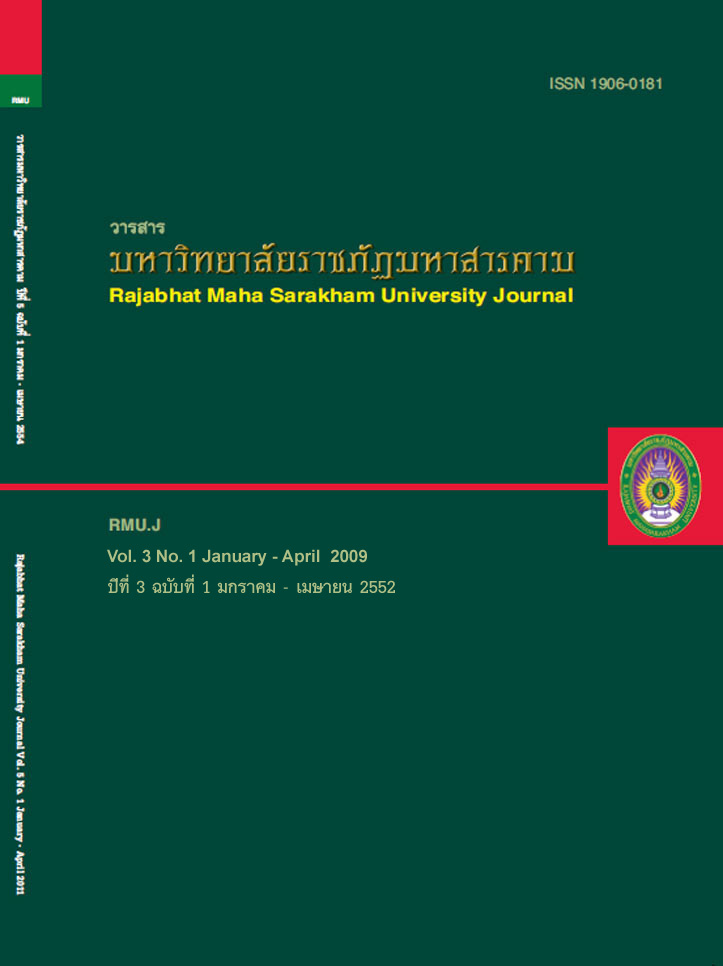ความสามารถในการจำตัวเลขของเด็กที่อยู่ในภาวะเสี่ยงต่อการมีปัญหาทางการเรียนรู้ ระดับปฐมวัย โดยใช้เกมการศึกษา Numerical Recognition Abilities of Children with Early Childhood at- risk of Learning Disabilities through the Instruction Based on Educational Game
Main Article Content
บทคัดย่อ
การวิจัยครั้งนี้มีวัตถุประสงค์ ประการแรกเพื่อศึกษาระดับความสามารถในการจำตัวเลข ประการที่สอง เพื่อศึกษาดัชนี
ประสิทธิผลการจัดการเรียนรู้ ประการที่สามเพื่อเปรียบเทียบความสามารถในการจำตัวเลขก่อนและหลังการจัดประสบการณ์
การเรียนรู้ และประการที่สี่เพื่อศึกษาความคงทนในการจำตัวเลข ของเด็กที่อยู่ในภาวะเสี่ยงต่อการมีปัญหาทางการเรียนรู้ระดับ
ปฐมวัย โดยใช้เกมการศึกษา กลุ่มเป้าหมายการวิจัยเป็นนักเรียนที่อยู่ในภาวะเสี่ยงต่อการมีปัญหาทางการเรียนรู้ด้านการจำ
ตัวเลข กำลังเรียนชั้นอนุบาลปีที่ 1 และอนุบาลปีที่ 2 อายุ 4- 6½ ปี ภาคเรียนที่ 2 ปีการศึกษา 2549 โรงเรียนบ้านหนองคู
สำนักงานเขตพื้นที่การศึกษามหาสารคาม เขต 1 จำนวน 8 คน โดยการเลือกแบบเจาะจง (Purposive sampling) เครื่องมือ
การวิจัย ประกอบด้วย แผนการจัดประสบการณ์การเรียนรู้ เกมการศึกษา แบบฝึกหัด และแบบประเมินการจำตัวเลข ใช้เวลาใน
การทดลอง 14 วัน การวิเคราะห์ข้อมูลแสดงเป็นค่าเฉลี่ย ส่วนเบี่ยงเบนมาตรฐาน และ t–test (Dependent sample) ผลการวิจัย
พบว่า
1. เด็กนักเรียนระดับปฐมวัยผู้ที่อยู่ในสภาวะเสี่ยงต่อการมีปัญหาการเรียนรู้ เมื่อผ่านการจัดการเรียนรู้ด้วยเกม
การศึกษาแล้วมีความสามารถในการจำตัวเลขโดยเฉลี่ยอยู่ในระดับมาก
2. ดัชนีประสิทธิผลของการใช้เกมการศึกษาในการจัดประสบการณ์เรียนรู้การจำตัวเลขเท่ากับ 0.734 คิดเป็นร้อยละ73.40
3. เด็กมีความสามารถในการจำตัวเลขหลังการเรียนด้วยเกมการศึกษาสูงกว่าก่อนเรียนอย่างมีนัยสำคัญทางสถิติที่ระดับ.05
4. ความคงทนการจำตัวเลขหลัง 2 สัปดาห์ เด็กมีความจำคงอยู่เฉลี่ยร้อยละ 75.00
The objectives of this research were 1) to study numerical recognition abilities of children with
early childhood at- risk of learning disabilities through the instruction based on educational games,
2) to study effectiveness index of lesson plans for learning numerical recognition of children with early
childhood at- risk of learning disabilities through the instruction based on educational games,
3) to compare their abilities on numerical recognition before and after learning management based on
educational games, and 4 ) to study their retention on numerical recognition abilities of children with early
childhood at- risk of learning disabilities through the instruction based on educational games, The sample
group consisted of 8 students at -risk of learning disabilities on numerical recognition, attending the first
and second kindergarten classes with the age range of 4 – 6 ½ years old during the second semester of the
academic year 2006 in Ban Nongkoo School, Maha-sarakham Educational Service Area, Office 1. Subjects
were selected by using Purposive Sampling. The instruments used in the research were 14 lesson plans
based on educational games, exercises and an evaluation form for numerical recognition. The total time
spent on the instruction was 14 days. The statistics used for data analysis were mean, standard deviation
and t-test of hypothesis testing.
The results revealed the following:
1. The numerical recognition abilities of children with early childhood at-risk learning disabilities
through the instruction based on educational games were found at a very high level.
2. The effectiveness index of the lesson plans for learning numerical recognition of children with
early childhood at- risk of learning disabilities through the instruction based on educational games was
0.734 or 73.40 %.
3. The numerical recognition abilities of children with early childhood at- risk of learning
disabilities acquired after learning management was significantly higher than before at.05 level.
4. Regarding retention of numerical recognition of children with early childhood who are at- risk
of learning disabilities through the using of educational games, it was found that the average retention
after 2 weeks was 15.00 or 75.00%. This showed that the students had retention of numerical recognition.
Article Details
1. บทความที่ลงตีพิมพ์ทุกเรื่องได้รับการตรวจทางวิชาการโดยผู้ประเมินอิสระ ผู้ทรงคุณวุฒิ (Peer Review) สาขาที่เกี่ยวข้อง อย่างน้อย 3 ท่าน ในรูปแบบ Double blind review
2. ข้อคิดเห็นใด ๆ ของบทความที่ลงตีพิมพ์ในวารสารมหาวิทยาลัยราชภัฏมหาสารคาม นี้เป็นของผู้เขียน คณะผู้จัดทำวารสารไม่จำเป็นต้องเห็นด้วย
3. กองบรรณาธิการวารสารมหาวิทยาลัยราชภัฏมหาสารคาม ไม่สงวนสิทธิ์การคัดลอกแต่ให้อ้างอิงแสดงที่มา


